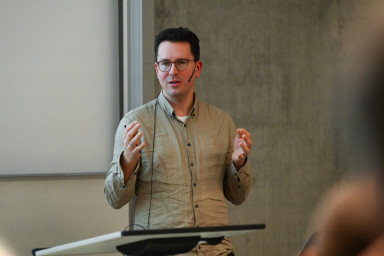03 Dec, 2024, 17:00HS 150, HCU
Prof. Dr. Armin Beverungen and M. Sc. Maja-Lee Voigt (Leuphana University Lüneburg)
Automating the logistical city: Mapping Amazon’s urbanism from the cloud to the curb

Image © Clara Mross.
Abstract
The central premise of our collaborative research projects exploring Amazon’s logistical urbanism is that Amazon must be understood as a key actor in contemporary urbanism, impacting contemporary cities from the curb to the cloud through its logistical operations and antecedent practices of space-making. In this presentation, we want to provide insight into three aspects of Amazon’s urbanism: first, the ways its administrative (and algorithmic) headquarters and their shiny front ends reshape global cities; second, how its warehouses integrate into existing infrastructures of transport and labour in urban peripheries; and third, how the topologies of its logistical operations are employing what is known as an ‘urban stack’ for (last-mile) delivery. In the process, Amazon is not only infrastructurally and algorithmically remaking cities, it is also turning cities into testbeds for automated futures.
Drawing on recent examples in Berlin and Washington, DC/Arlington, VA, we will demonstrate how the tech giant – on its front end – increasingly places itself at the heart of geopolitical centers. It builds campus cities that cater to its often homogeneous tech work force and business interests, mostly in partnership with public actors. In addition to these privatization efforts, Amazon settles onto already existing public infrastructures: Not only does it data-mine, but it also uses urban space as a testing grounds for its speculations, thereby foreclosing democratic discussion on future technologies and topologies.
Similarly, Amazon perceives cities as its back end to logistical operations. Especially their marginal places and populations seem to provide the company with a precarious work force on whose backs Amazon runs its empire. As our ethnographic fieldwork in the Ruhr region from 2021–23 shows, already-established industry infrastructures and the loss of a modern job motor have been fueling cluster politics that aim to bring Big Tech into town. Being far more than just a virtual warehouse, Amazon, here, materializes in public-private partnerships, in a new logistical organization of our everyday lives, and in still uncertain future climate effects on already vulnerable and polluted neighborhoods such as Dortmund’s Nordstadt.
If we further explore Amazon’s logistical operations, which tie its administrative centres and warehouses together in a unique topology, we witness how this topology reaches into the city for last-mile delivery. In doing so, Amazon employs various elements of infrastructure as logistical media, repurposing them to serve an automation of logistics and, in the process, offering a particular version of convenience and a city that serves it. Our presentation seeks to visualize these often invisible or conveniently ignored footprints of the global giant Amazon, urging urban professionals to pay attention to how it is slowly but surely settling onto already-existing (public) infrastructures – making them profitable, predictable, and privatized – and relentlessly speculating on urban futures in the image of convenience.
Bio
Maja-Lee Voigt (she/her) is an urban researcher, PhD student at Leuphana University Lüneburg, and co-founder of the interdisciplinary city research collective Akteurinnen für urbanen Ungehorsam in Hamburg. Assisted by a methodological toolbox of ethnographic and critical feminist thinking, she is currently researching Amazon’s monopoly on bits, bytes, and boxes with the ‘Automating the logistical city’ research project. Overall, Maja-Lee’s work focuses on tech monopolies’ city designs, tackling questions about (resisting) algorithmic architectures of oppression, and hacking patriarchy to move towards more just urban futures.
Armin Beverungen (he/his) is a professor for the sociology of organization and economy at the Institute of Sociology and Cultural Organisation as well as the Centre for Digital Cultures at Leuphana University Lüneburg. His research is currently concentrated around two projects: one exploring Amazon’s logistical urbanism (https://logistical.city/) and another probing the promises of wealth associated with smart, urban technologies such as digital twins (http://smartnesswealth.net/).
Workshop
In addition to the lecture, Maja-Lee Voigt and Armin Beverungen will hold the interactive workshop ’Researching Digital Urban Futures Critically?‘ the following day. The workshop takes up themes explored in the lecture and deepens them with a specific view to the challenges of ethnographic fieldwork and other qualitative modes of inquiry in the context of tech and logistical urbanism. What does it mean to do critical urban research in the age of Amazon, Facebook, and Google? Mapping out key challenges and aiming to identify new pathways forward, we open up a conversation about big-tech corporate ‘black boxes’ and algorithmic opacities on the one hand and potential ‘coping strategies’ and ethnographic workarounds on the other.
The workshop takes place Wednesday, 4 December, 10am – 1pm at the project room 01.06.01, Campus Tower, Versmannstraße 2.
We welcome everyone interested. If possible, please pre-register here: fabian.namberger@hcu-hamburg.de. Spontaneous drop-ins are also welcome.